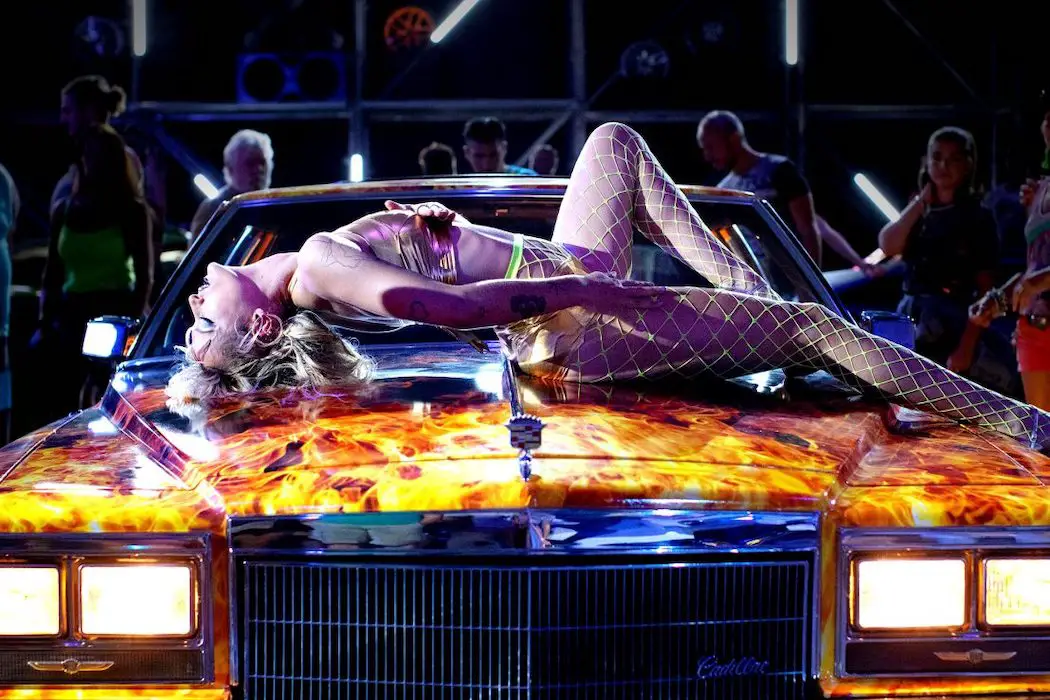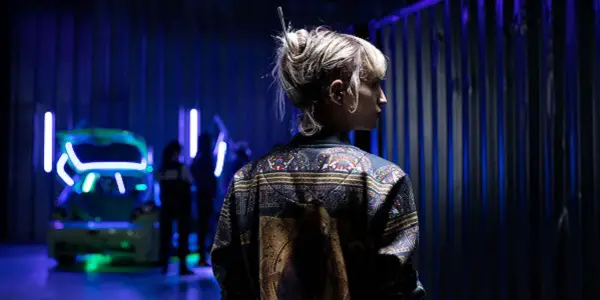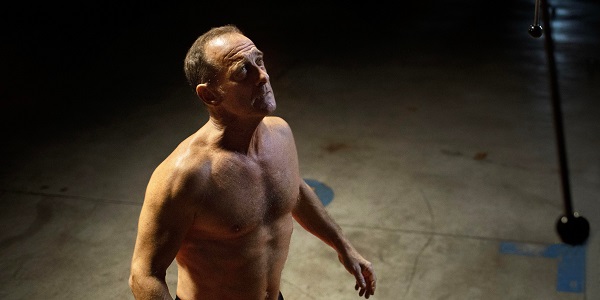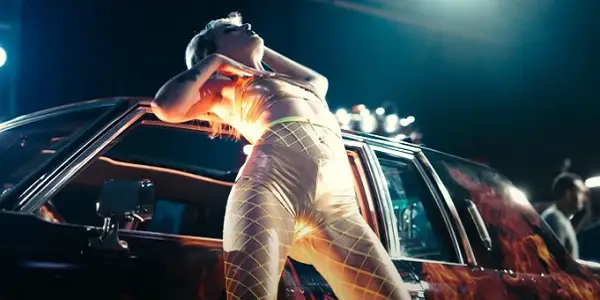NYFF 2021: TITANE

Lee Jutton has directed short films starring a killer toaster,…
French filmmaker Julia Ducournau’s debut feature, the freaky feminist horror flick Raw, took the traditional coming-of-age tale of a girl going away to college and discovering herself and filtered it through a sticky, blood-spattered lens. In Raw, a lifelong vegetarian named Justine (played by Garance Marillier) goes to veterinary school and, in the process, discovers a bottomless hunger for human flesh. What follows is a richly rewarding and darkly hilarious film about one woman’s fight for control over her own body, and one of the most audacious directorial debuts in recent memory.
Throughout Raw, our heroine struggles to control her urges, despite only feeling truly confident when she throws away her inhibitions and chows down—on classmates, anonymous car crash victims, and even herself. No matter how disturbing the imagery, Ducournau’s camera never flinches, never looks away, defiantly demanding that you do the same. Her boldness as a director, in turn, emboldens the audience, giving us permission to be entertained by and even empathize with the most horrifying of acts, such as Justine nibbling on her own sister’s severed finger.
Ducournau’s sophomore feature, the Palme d’Or-winning Titane, takes the most thrilling elements of Raw, shoves them into a juiced-up hot rod, and stomps on the accelerator. It’s a wild ride into a world defined by visceral violence, bold sexuality, and above all, the emotional rollercoaster that is unconditional love. The main characters in Titane, like Justine in Raw, suffer in their bodies, which are undergoing changes beyond their control. Yet their need to love and be loved for who they are, no questions asked—even if that love is born of a lie—is what defines them as human despite it all. It is this need that is the throbbing heart of Titane, and what elevates it from mere shock and awe to a truly brilliant movie.
Heavy Metal
As a young child, Alexia is injured in a brutal crash inadvertently caused by her own naughty behavior in the backseat of her father’s car. To save her life, titanium plates are inserted into her skull, which now sports a curling, snail-like scar above one ear. Yet the changes to Alexia’s body are not merely skin-deep; upon exiting the hospital, the young girl ignores her parents and embraces their car, planting a loving kiss on the window. It’s as though the metal inside her body has given her a strange new connection to the machine world at the expense of the human one.

As an adult, Alexia (newcomer Agathe Rousselle) works as a scantily-clad dancer at a sexed-up car show, writhing on top of vehicles while men watch. The same men eagerly greet her after the show, asking for her autograph and professing their love to her, but Alexia is unimpressed; she’s more drawn to metal than to flesh. When Alexia has a sexual encounter with a fellow dancer, Justine (Marillier again, and not the only main character who shares her name with someone in Raw), she is drawn more to Justine’s nipple piercings than the woman herself, nearly yanking them out with her teeth in the throes of her desire. Despite Alexia still living with her parents, there is an awkward distance between them; it’s clear that they do not understand Alexia, and are perhaps even slightly afraid of her. And yes, as you no doubt have already heard, Alexia even manages to have passionate sex with a car—the consequences of which later become horrifyingly apparent.
After a series of brutally violent acts, Alexia finds herself on the run. Desperate, she decides to disguise herself as a teenage boy who has been missing for a decade—cutting her hair, binding her breasts, and even smashing her own nose. The boy’s father, Vincent (Vincent Lindon, for whom Ducournau wrote the character), an aging firefighter who injects himself with hormones daily in an attempt to hold on to the youth and strength that is all too quickly slipping away from him, accepts Alexia as his missing son, no questions asked; he even refuses a DNA test. Does he truly believe that this is the long-lost Adrien, or is he just so happy to have someone to care for again—a reason to keep living even as his body continues to waste away against his will—that he doesn’t actually care? “No matter who you are, you’re my son,” Vincent tells her, and it’s that surprisingly heartwarming sentiment that truly sums up Titane, much more so than the hyperbolic exclamations dubbing it “the most shocking film of 2021.”
Family Matters
While Alexia at first sees Vincent as suffocating and even threatening in his obsessive desire to father her, she does grow to care for him in a way that she never seems to have cared for a human being before. Vincent loves her wholly, without knowing or caring about the metal plates in her head and the strange desires they give her, and she returns the feeling with warmth and gratitude. They need each other desperately; without Vincent’s protection, Alexia is guaranteed to be captured by the police, and without Alexia’s presence (as Adrien), Vincent has little reason to keep living. They aren’t each other’s chosen family so much as their accidental family, but whatever label one attempts to ascribe to it, one is fully invested in their relationship thanks to the remarkable chemistry between Rousselle and Lindon, whose performances deserve to be recognized among the best of the year.

As Alexia, Rousselle’s unusual, androgynous appearance makes her attempts to masquerade as a teenage boy much more believable than they ever had any right to be; she lives fully within this character’s skin, making even her most bizarre actions worthy of empathy. That she’s a new face in movies definitely helps; if she had been too recognizable from previous work, it may have been more difficult to truly accept her as this singular character, but without any previous baggage, we’re free to buy into her performance. You’re probably going to hear a lot about her “bravery” and the role’s “physicality” because she spends a large portion of the film’s running time naked, including the aforementioned sexual encounter with a car and painful binding of breasts. I’m not sure if I would use either of those words to describe what Rousselle is doing in Titane because I don’t think either of them does her work justice.
So often women are lauded for being brave and physical in movies that are still so annoyingly masculine; that does not apply to Titane, which like Raw is boldly and unapologetically female in its perspective on women’s bodies and sexuality. The various nude scenes never feel sexualized, just matter-of-fact. Even in the sequence at the car show, where women are paired with cars for men’s objectification, Ducournau manages to utilize all of the cliches of what men find sexy without the scene feeling exploitative; if anything, watching Alexia dance on the hood of the car feels strangely empowering. These women aren’t being brave, per se, they are just being themselves without caring about how others perceive them—which I suppose in many ways is its own form of bravery, especially in the eyes of men.

One of the joys of watching Titane is that you are guaranteed to snicker just as much as you’ll squirm. Ducournau has a knack for finding humor in the darkest and weirdest of situations, including the violent ones, giving the audience enough moments of mid-movie catharsis to help them make it to the end. Vincent’s earnest attempts at fathering, and Alexia’s reactions, result in many laugh-out-loud moments that provide much-needed respite between the film’s more adrenaline-pumping and cringe-inducing scenes. For instance, your shoulders might be hunched with anxiety as Alexia attempts to cover her nude body with a towel when Vincent walks into the bathroom, but when Vincent picks up a razor and offers to help his “son” grow a beard by tenderly applying shaving cream to what isn’t there, it’s impossible to not crack up and thus instantly relax—at least temporarily.
Throughout Titane, there is a focus on fire and metal—both capable of destruction in their own ways—that is reflected in the film’s cinematography, courtesy of Ruben Impens (who also worked on Raw). Every frame of Titane is alive with contrast and color, light and darkness—beautiful to look at without being so stylized as to distract from the substance of the story. Composer Jim Williams, another collaborator from Raw, gives Titane a suitably intense score, using pounding percussion and ringing bells to drive the momentum of the film and ratchet up the tension when warranted. But it’s the perfect use of pop songs that grounds Titane in a world we can recognize and relate to amidst all the insanity.
In one of the film’s most enjoyable scenes, Vincent puts on The Zombies’ “She’s Not There” and forces his newly returned son to dance with him, Vincent’s joy a marked contrast with Alexia-as-Adrien’s awkwardness. Another particularly delightful moment on the scene of an emergency ensures you’ll never hear “Macarena” the same way ever again. Both scenes stand out because they epitomize the combination of character and craft that makes Julia Ducournau one of cinema’s most thrilling young storytellers, someone whose movies delve far deeper into human emotions and insecurities than any surface-level descriptions of their admittedly outrageous content could possibly convey.
Conclusion
Titane spins elements of body horror and science-fiction into a beautiful tale of love and identity, grounded in true human emotion, as only Julia Ducournau could do it.
What do you think? Are you familiar with Julia Ducournau’s previous work? Share your thoughts in the comments below.
Titane is currently screening as part of the Main Slate at the New York Film Festival and will be released in the U.S. on October 1, 2021. You can find more international release dates here.
Does content like this matter to you?
Become a Member and support film journalism. Unlock access to all of Film Inquiry`s great articles. Join a community of like-minded readers who are passionate about cinema - get access to our private members Network, give back to independent filmmakers, and more.
Lee Jutton has directed short films starring a killer toaster, a killer Christmas tree, and a not-killer leopard. Her writing has appeared in publications such as Film School Rejects, Bitch: A Feminist Response to Pop Culture, Bitch Flicks, TV Fanatic, and Just Press Play. When not watching, making, or writing about films, she can usually be found on Twitter obsessing over soccer, BTS, and her cat.













